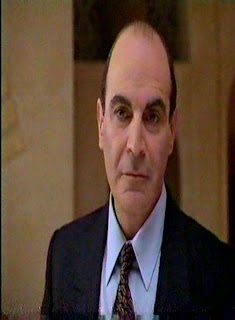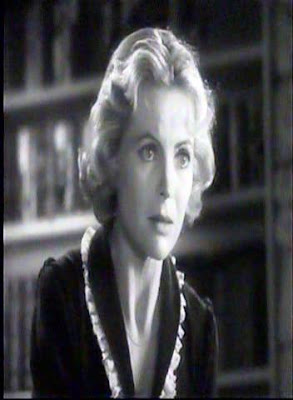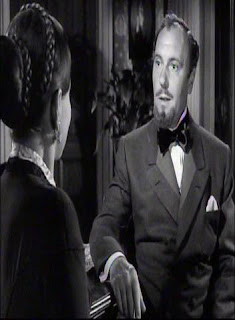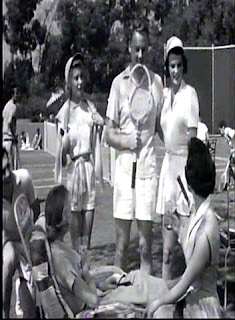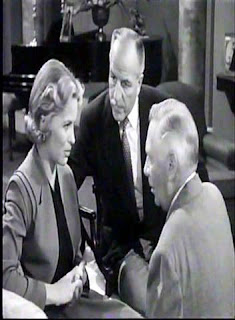In “The Heiress” (1949) and “Invitation” (1951), we have two motherless young women whose wealthy fathers betray them emotionally. Each is romantically pursued for her fortune. Each must come of age under extreme duress and pass through a kind of trial by fire to reach a sense of empowerment. For one, even that final achievement is sad because she does not find what the other has been serendipitously gifted: a husband who loves her.
Before we entwine these two films together, we need to yank them apart. “The Heiress” (and I must make mention, once again, of
the wicked Carol Burnett parody which always comes to mind when I watch this film, alluded to in this post) was originally a stage play, which was originally from the Henry James novel “Washington Square”. Our view of the setting of this Gilded Age story is fairly authentic, in sets, costumes, and hairstyles because of this, and since this is a post-World War II film, we may marvel at the similarities from one century to another in depiction of an otherwise undesirable woman’s chances for marriage (her highest hope for success as a woman) being based on her wealth.
Olivia de Havilland is superb as the intelligent and sensible, but shy and awkward daughter of a sarcastic and self-superior father, played by Sir Ralph Richardson. (Though Wendy Hiller played Olivia’s part on stage, and I would have loved to have seen her, too.) Richardson dominates her in a subtle swordplay of mind games couched in deferential Victorian manners so much that, like his daughter, we may not catch on until well into the film the depth of his dislike of her.
Montgomery Clift plays her suitor, just as coyly manipulative and so earnest and charming in his manner to her, we likewise may not realize his insincerity until well into his plot to marry her for her money. Father has suspected from the beginning, though, but rather than run the blackguard off straight away, he plays cat and mouse with Clift, with his daughter, and in a skillful interrogation scene with Clift’s sister, to demonstrate that anyone in his right mind would not want his loser daughter for a wife. Any man wanting to marry his daughter must be marrying her for her money, because in her father’s mind she is totally worthless in all other respects.
This arrogant father cannot simply forbid his daughter to marry a man of whom he does not approve; he must humiliate her as well, for her own good.
Like most films adapted from stage plays, the setting, mainly confined to rooms in their Washington Square townhouse in New York City, is intimate. There is nowhere to run, so conflict must be faced within a confined space. Characters are crisply drawn, with a precise orderliness to the plot. I love that about film scripts from stage plays.
Miriam Hopkins plays Miss de Havilland’s fluttery, superficial aunt with her trademark irresistibly self-serving coyness. Montgomery Clift could charm the birds from the trees in his humorous, affable romantic approach to the painfully socially backward de Havilland. He does not strike us first as a scoundrel, but rather as the answer to her needs, and we may take Mr. Richardson for an ogre in his disapproval, until the seismic shift in plot occurs and we see that he is proved right about Clift.
Some fun scenes include the athletic polka Miss de Havilland suffers through with an energetic older gentleman, and another when Montgomery Clift deposits himself at her spinet and sings “Plasir d’amour”. It’s a bit rocky, but we have to give him high marks for performing it himself.
When Mr. Clift leaves his gloves behind, de Havilland places her hand atop his glove, in what must be a more socially safe expression of her desire for him.
William Wyler is the director, and here as in many of his films where he is often called a director without a particular trademark style, lets the story tell itself in its own milieu, which is stagecraft. Only rarely do we see the camera butting in to tell its version of the story, such as a great shot of de Havilland climbing the steep, seemingly endless staircase towards us, stunned and utterly miserable, after she realizes Clift has abandoned her. The scene is repeated at the end of the film when she trudges up the stairs after having refused him, older, wiser, wealthier after the death of her father, in a white Paris gown, looking resolute if not exactly triumphant.
There indeed is no triumph for Miss de Havilland, who spends much of film being treated with so little sensitivity that it could not be more cruel if she had been beaten with a stick. Her neediness and its being rebuffed is heartbreaking. When she anxiously asks her father to be nice to her suitor and pleads, “It will not be immodest in you to praise me a little,” his harsh pragmatism responds to Hopkins, “How is it possible to protect such a willing victim?”
She is a willing victim, and grows more willing and more desperate when she at last realizes her father’s disgust with her. It takes more than his usual finesse at sarcasm to make it clear to her that Clift is the wrong boy for her. Losing patience with her devotion to Clift, he impresses bluntly upon de Havilland her unworthiness, and that her only attraction is her inheritance.
Humiliated, she at last learns a hard lesson in her father’s disdain for her, but does not yet understand he was right about Clift. Agreeing to elope with him, she ecstatically murmurs the wondrous phrase, “My husband!” and seems to melt into his neck in a stolen moment in the rain-splashed mews, never sensing Clift’s newfound hesitation to be married now that she has told him Father is disinheriting her.
It is left to Aunt Miriam Hopkins to splash a little more ice cold water in her face with the remonstrance, mourning the news that de Havilland told Mr. Clift about the disinheritance.
“Why were you not more clever?” Humiliated, once again, by the knowledge that everyone holds the same opinion of her unworthiness to be married, including her favorite aunt.
Spending a long night by the door with her luggage, waiting for him to elope with her, Miss de Havilland miserably realizes Clift has abandoned her, now that Father’s money does not come with her.
But, Father dies suddenly, and she inherits after all. In their final face-off, she throws his contempt back in his face, “Since you couldn’t love me, you should have let someone else try.”
She is immune to flattery or persuasion for the rest of her life, and when Clift finally returns, she coldly dismisses him with a trick played on his vanity.
“Can you be so cruel?” Aunt Miriam Hopkins, who always had a soft spot for the ne’er do well, asks her now uber-empowered niece.
In one of the best lines, de Havilland explains the meaning of life to us, “Yes, I can be very cruel. I have been taught by masters.”
It is interesting that the film “Invitation” (1952), reflecting American society one hundred years after the period depicted in “The Heiress” has so similar an attitude towards the failure of a woman to be marriageable and the ability of her father’s fortune to make up for that.
Two hundred years previously, the always money-conscious Jane Austen in her novel “Emma”, gives us a wealthy heroine with no intention to wed, because she does not need to in order to keep her elevated place in society. As she merrily philosophizes to her friend, “I have none of the usual inducements of women to marry. Were I to fall in love, indeed, it would be a different thing!”
“But still, you will be an old maid! and that’s so dreadful!”
Emma counters, “…it is only poverty that makes celibacy contemptible to a generous public! A single woman, with a very narrow income, must be a ridiculous, disagreeable old maid! The proper sport of boys and girls, but a single woman, of good fortune, is always respectable.”
A comic and sardonic stance, but one that would have struck horror in the hearts of Victorians, and perhaps in the post-World War II era when certain affectations of Victorianism remained, like the ignominy of being unmarriageable.
The rich girl in “Invitation” is Dorothy McGuire, who shares de Havilland’s mild demeanor, and her social reticence if not her actual awkwardness. Her father, the much more loving and doting Louis Calhern, also, however betrays his daughter in an unusual twist in this lush movie soap opera.
Miss McGuire, though not without friends among her breezy social set, is somewhat distanced from them by a mysterious heart condition she has suffered since childhood. They run around her father’s lawn party in tennis shorts, while she reads with a blankie over her lap. Mr. Calhern’s anguish over her loneliness is a sharp contrast to Ralph Richardson’s callous attitude in “The Heiress”, yet Calhern manages to be just as devious, and just as hurtful, when he uses his wealth to attract a suitor for her.
Another aspect the two films share is the presence of the ever-reliable Ray Collins, who plays de Havilland’s uncle, and the family friend and doctor of Calhern and McGuire. Like most old movie doctors, he diagnoses an incurable disease for McGuire and will not tell her what it is, but does a lot of hand holding and smiling.
Miss McGuire, it has been determined, has one year to live. Among her friends is Van Johnson, on whom she has an unspoken crush. Van is a pleasant, kindly, but unsuccessful young man, perhaps not too dissimilar from Montgomery Clift in his charm, his lack of prospects for wealth, but Van is far less clever and far more lazy to do anything about it. In steps Mr. Calhern, who buys Van Johnson for his daughter. One wonders what kind of story would play out if Ralph Richardson had bought the ambitious Montgomery Clift for Olivia de Havilland.
Interestingly, Calhern is just as disapproving of Johnson as Richardson is of Clift. He tells Van bluntly that he is not the person he would pick for a son-in-law. But instead of withholding his wealth, like Richardson does, to make Van go away, he dangles it in front of him as bait to marry his dying daughter.
The story is told through overlapping flashbacks common to the film noir of the era, and probably would make a good murder mystery, except nobody is murdered. Ruth Roman, however, who plays McGuire’s former friend and now rival for Van, is deliciously vindictive, with such glossy venom one expects a murder any minute, but that’s not Ruth’s style. She’s like a spider spinning her web, and her long-range plans are predicated with the knowledge that McGuire will die anyway.
We referred to Miss Roman’s scene fingering Van’s slide rule in this previous post.McGuire, acknowledging to her father her unmarriagability, like Jane Austen’s Emma, seems to come to comfortable terms with it.
“I don’t mind the fact that I’m going to be a spinster at all…I’m going to be a spinster, Father, all my life, but there’s an awful lot to be said for it.” Her outlook is admirable; it is her father who is bothered by it because above all, he perceives her loneliness.
But when Van Johnson proposes, she is humbly dumbfounded at what he could possibly see in her. She gushes with near hysterical emotion to her rattled father, “That means I’m not so -- that means I can be a woman and have a home! Father, somebody loves me!”
Putting aside whatever feminist cringeworthiness we may have for this outburst, it’s a genuinely affecting moment, made real by her humility and her until now unspoken desire to be loved. After the marriage, in a quiet conversation with her father, she acknowledges “the excitement of knowing from a lifetime of having been sort of pitied and left out of things, this morning I poured a second cup of coffee for a husband of my own.”
But her unknown enemy now is time, and how little she has left. Will somebody, like the evil Ruth Roman spill the beans and ruin her happiness by telling her that not only is she going to drop dead one of these days, but her husband does not really love her; he was only purchased, leased if you will, for her remaining year of life?
Yes, as a matter of fact, that is what happens. McGuire finds out over the span of one awful afternoon which sends her rushing to the encyclopedia to read about her condition, and putting two-and-two together to finally realize than Van Johnson, who is the love of her life, came with the fur coats, the house, and the other presents her father gave her.
Dorothy McGuire goes off the wall for a little while in some good scenes where she blasts both her father and her husband, and then, almost catatonic, retreats into herself while she watches Van Johnson with something colder than hatred in her expressive eyes as he tries to explain himself. It’s a great range of emotion, and she plays it well, reaching into the depths of this deceived woman’s psyche without chewing the scenery of their faux-New England renovated farmhouse. At times her words are thick with tears, at other times, steel enters her trademark well-modulated voice and it goes flat and hard.
“Is Dan on a weekly salary, or did you get him for a fat fee?” she asks Pop, skewering poor Louis Calhern over the phone.
Speaking of film noir techniques, there’s an interesting shot where she goes to the picture window, and looks out at an image of herself kissing her husband goodbye as he drives off to work. Not sure if it’s rear-screen projection, but it’s a nice touch, and she makes it go away by drawing the curtains.
Barbara Billingsley Alert: The Beaver’s mom plays Louis Calhern’s secretary.
One weakness of the film seems to be Van Johnson’s weakness. We are told, and are prepared to believe, that he is a nice guy, but flighty and without much backbone. The trouble is, when it comes time for us to believe he loves her, as the film wants us to do, we can only accept it as a fact because he’s Van Johnson, and Van Johnson is such a swell guy. But neither the script, nor Mr. Johnson, ever gives us the reason to believe he has inadvertently fallen in love with his wife; we must accept it on faith.
So must she, at this point, with little proof otherwise. It would have been a stronger film if we could see him grow to love her, need her, desire her, not just be on solicitous tenterhooks over her health because he knows she is going to die.
A happy ending gets tacked onto the film when we are treated with a brief scene reprising her kissing him off to work in the springtime which infers that the mystery movie operation she had to cure her heart ailment worked, and she will live for many years with a husband who loves her, in this faux-New England junior executive house with the odd wooden bridge over the pond that must be a real pain to clear snow off of in the winter. Nobody in Hollywood thinks of things like that.
Although, I must say, I do like the way their gardener asks McGuire if he can mulch their autumn leaves and not burn them. Good for the garden, he says. Very eco-friendly, this movie.
Come back next Monday when we see that sometimes the girls who are married for their money are also murdered for their money.
 Storyline:
Storyline:


















